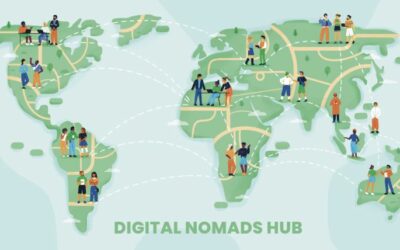|
|
Is there a maximum amount of time that a person can expect to spend as a digital nomad before returning to a more location-stable lifestyle? Both empirical research and anecdotal reports for real-life digital nomads suggest that there is!
Research now suggests that about five years is the expiration on the digital nomad lifestyle for most people. Let’s take a look.
Feeling Homesick
Research for this article started when I saw a Daily Mail article about UK digital nomad Lauren Juliff. She started traveling in 2011 after graduating from university and made a living through her travel website Never Ending Footsteps.
She spent the first year or so on her own before meeting her partner, also a digital nomad, and traveling together. She visited 75 countries in five years.
But it was at around the five-year mark that the experience stopped being fun, and Lauren started to suffer from panic attacks. It seems that these were caused by the stress of having no firm roots and constantly having to change her living situation, routine, friendship group, and so on. The only way she could find to calm her nerves was my thinking of home.
This led Lauren to change her life again, settling down in Lisbon. To her surprise, her followers who had become invested in her travel journey became angry at her choice to “confirm”. Nevertheless, she had to pursue what was right for her. She now lives in Melbourne, Australia with her partner and his family, but still travels for about three months of each year.
Was this “five-year itch” inevitable? Maybe.
Why Do People Become Digital Nomads?
Why do people become digital nomads? Research by Kristina Devcic and Ivana Tonkovic Prazic into the motivations of digital nomads living in Croatia suggests four primary motivations for adopting the digital nomad lifestyle.
Socio-Political Reasons
First and foremost, many people embrace the digital nomad lifestyle for the same reasons that people immigrate to new countries. They are looking for a better life, perhaps making their money go further with a more affordable cost of living, or looking for ways out of countries with social and political conditions that they don’t like. Being able to move without the concern of finding a job in a foreign country is desirable.
Changes in Standard Working Conditions
The next factor they identified was opportunity. The shift towards remote working more generally means that more people have the opportunity to embrace the digital nomad lifestyle. This coupled, with the increased visibility of the way of life online means that more people are considering giving it a go.
Desire to Change Life
Many people just aren’t happy with their lives and where they are now, and they want to make a change. When you read stories, many people point to breaking up with a partner or losing a job as a catalyst for becoming a digital nomad. Often people know that they want to make a change, but they aren’t sure what change to make. The digital nomad lifestyle can represent a different type of commitment that feels more accessible.
Desire to Travel
Of course, the desire to see more of the world but not have the time to do it with a full-time job is a major motivating factor.

Does a Digital Nomad Journey Have an Expiry Date?
Beverly Thompson, a digital nomad herself and also a sociologist from Siena College in New York suggests that the excitement of the digital nomad lifestyle wears off for most people by or before the five-year mark.
Many of the factors that influence this are the ones that Lauren mentioned in her personal account. They were also mentioned by Francesca Specter in her article for the Guardian.
She found herself caught in a kind of limbo. She didn’t have the stability of a routine and a home that she had designed as a sanctuary that facilitate a healthy work-life balance. She also did not get the relaxation and joy that people who travel for tourism get. In fact, she felt envious of the travelers she saw around her as she tried to work from busy cafes.
The other big contributor is the lack of social connection that human beings need. It is easy for connections with people back home to become challenging, and not just because of distance and time zones. The different lifestyle choices reduce the things that you have in common and can make it hard to connect. At the same time, it can be difficult to make local connections due to language and cultural barriers, and just the fact that you aren’t there for that long.
These are the reasons that so many digital nomads reach out and join online communities of digital nomads. They are looking for people that they can relate to and with whom they can build a connection. But these online friendships, while incredibly important, can’t substitute in the long term for day-to-day interactions with people you care about and long-term, deeper connections.
Thompson suggests that while the benefits may outweigh the negatives for many people for a number of years, there does come a point where that is no longer the case. For most people, this is probably before the five-year mark.
But How Easy Is it to Leave the Digital Nomad Lifestyle?
But further research suggests that giving up the digital nomad lifestyle and returning to a more “normal” way of life is not always as easy as it sounds.
Vincenzo Luise’s 2022 paper published research conducted with digital nomads living in Chiang Mai and Bangkok, Thailand.
His research suggested that the majority of digital nomads enter the lifestyle considering it temporary. They tend to embark on the journey considering it a kind of self-realization project. They intend to gain experience and set themselves up financially and emotionally for a post-nomadic life, either back in their home country or as an expat.
However, he also found that becoming a digital nomad can embed constraints within a person’s lifestyle. This relates to work opportunities, property ownership, investments, pensions, and other financial matters, but also in terms of social connections and laying down roots.
These factors can make it challenging to disentangle yourself, and the digital nomad lifestyle can become permanent.
Research into leaving the digital nomad lifestyle and what it means to be an ex-digital nomad is in its infancy. We will definitely be keeping our eyes open for more.










